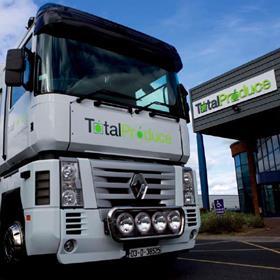

What are the big challenges facing the business at the present time?
There are two types of challenges that the business is facing: inherent ones like weather and the broader economy and secondly the changes within the industry. Both of the inherent issues do pose real challenges at present. The recession means we are seeing consumers change their shopping habits by recognising in these more difficult times that things like reducing waste are important to save money, so they buy one apple less or reduce pack size rather than throw product away.
This sort of change, I believe, is here to stay. Another product of recession is retailers always looking for better value. The continuous process of trying to re-engineer your thinking, look at your supply chain and come up with better value has become a critical part of delivering what our customers need. Even better-off consumers are thinking in a different way. The second inherent issue is weather, and whether we like it or not, and whatever the cause, the weather is certainly becoming more erratic. Everywhere you go in the world there seems to be a fundamental challenge from it – colder winters, wetter springs, all beyond our ability to control. So, as an industry we have to put more thought into having contingencies in our procurement and developing varieties that can cope with the changing conditions. Both of these need investment and that’s where the industry challenge comes into play, because without making sufficient profit you can’t invest in creating options to try to reduce the impact of things like the weather. If you talk to anybody in our industry, making money is not an easy thing to do.
How key is having the right structure of the business and specialist divisions?
We believe it is vital. Today you need to be an expert and know what you’re talking about. Retailers are focused and they and other customers expect you to know what you’re talking about and the only way you can have real expertise is to have focus within your business. The second factor that influences this focus is about investment. If you’re going to invest in varieties and supply chain then you’re going to need volume and scale to do that. For Total this means we can look at categories on a global basis and we seek to manage the supply chain within these categories to ensure we achieve the most cost-effective solution, and we can do this by avoiding duplication of overheads, so in each of the countries we operate we have the opportunity to spread the cost.
Do you worry about how retailers’ moves towards direct sourcing might affect you?
Our belief is, wherever you go in the world, retailers have different models; some have gone down the route of saying it’s all in-house and direct to growers, and others have said ‘I don’t want to do that, I want to trade, I want a more flexible approach’, while others still have a mixture. Some have gone all the way down the direct sourcing route and then stepped back because they’ve recognised that in some product areas it’s better to actually rely on somebody else’s expertise, and they have also recognised the cost and risk they are putting in doesn’t add up to the savings.
So our premise is: work out what your USP is, understand very clearly that you can add value and then build your business around this. If you haven’t got a USP, you won’t be there. You can’t push water uphill. A personal belief I have is that no matter how good a customer becomes in their direct sourcing, there will always be a need for an alternative, either to reduce some of the risk or to test their business model. I believe Total should be that alternative, because I think there won’t be many alternatives left.
Have you made any structural changes to the business this year?
In UK terms we are still changing. We brought in Mark Player to strengthen our team and we plan to add more to expand our capabilities. As a group we are also bringing new people into our businesses in Europe with new skills, including retailing, as we try to understand our customers more deeply, and we’re keen to bring in skills in other areas. We have to become more aware of the customer and be aware of their thinking and get rid of some of the smoke, glass and mirrors that has characterised produce over the years.
Now, the retailers understand the supply chain very well, so – and it’s back to the earlier question – you have to be able to add value. It’s as simple as that, whether we like it or not. How you can add value does vary from country to country, for example in Scandinavia the model is totally different and here we have a fully integrated business model with some of the retailers.
In Helsingborg in Sweden we provide an integrated service to some retailers and because of this we have been able to invest in technology such as robotics and help the retailer manage the whole process right the way to the shelf. One of the great things about being part of a group means some of the learning from one side of the business can valuably be used elsewhere.
How do you see the wholesale trade at the moment?
If you look at Total, it has great balance and a great geographic spread. It provides a robust business model and as a group it consistently delivers profits; this gives it the ability to invest in the long term in order to satisfy its customers’ evolving needs.
Wholesale is part of a balance and as a sector we all know it has been declining for a long time. The decline of the sector has resulted in a lack of investment. As a result, most of the markets were built in the 70s or before, so they are becoming past their sell-by date. With private markets there has been more continuity of investment, but there comes a point in time when you have to look to the future and rebuild and the time is coming to do that, as is happening in Birmingham.
Our view is that there will always be a need to supply local people. I’m a believer in the concept of local provenance and I think we will see people more focused on buying something that was actually grown nearby. It has always been a key factor in some parts of the UK and I really think provenance is an important thing. Wholesale is that local route to market and we continue to believe it has a future.
Which areas are particularly ripe for growth?
We see convenience as a very exciting sector. We think one of the exciting things about convenience is that it is as relevant to wholesale as it is to our other businesses. It’s about the local supply of product and one of the reasons we’ve always believed that wholesale has a future is we always think there’ll be local customers. The major multiples have all woken up to that with major investment in convenience stores. —
Punter says there is a need for further industry consolidation, but stresses Total looks at whether a potential acquisition fits with its business and has good people. “I am sure we will make more acquisitions and I’m sure we’ll be very busy in the wholesale sector and maybe on the retail side.”



